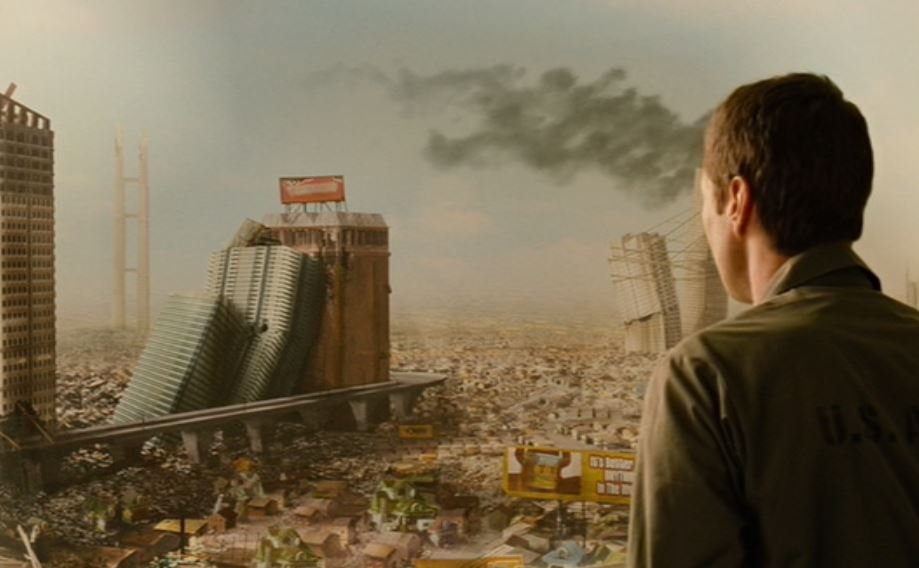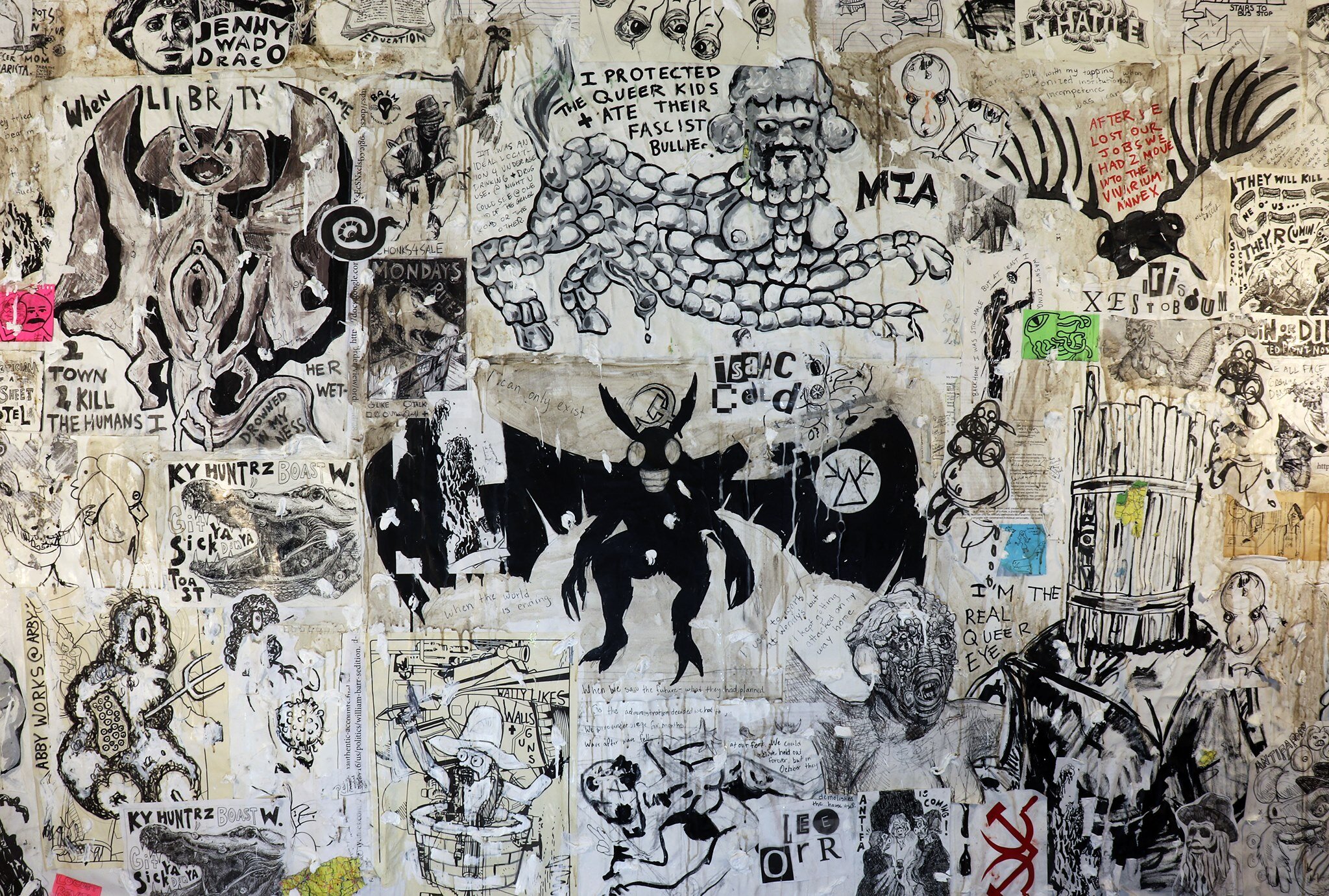Theses on the Theatrical Party
Political action is a performance in that it is the presentation of aesthetic work before an audience. The epoch of the digital gesamtkunstwerk has interpenetrated the aesthetic element into the whole of everyday life. Whether the trend of aestheticization or politicization predominates is left to the subjective element —leadership. As Communists, our aim is to relentlessly politicize aesthetics and with it every moment of lived existence.
Ants from Down There
This defiant escapism is followed by the indie rock ballad “Concorde” – part romantic gesture, part confession of codependency drenched in a gooey nostalgia. The chorus compares the subject of affection to the supersonic passenger jet Concorde that allowed 3 hour transatlantic flights between 1974 and 2003, while putting the narrator in the position of the much more modest “gentle hill racer”: “And you, like Concorde/I came, a gentle hill racer/I was breathless/Up on every mountain/Just to look for your light”
Red Jackalope Diary
I am a city boy, from my forehead down to my feet. A lifelong resident of Rogers Park, a neighborhood on Chicago’s Far North Side, I never imagined I’d live anywhere else. Yet, for the past two years, I’ve been staying at my wife’s family home in Morton Grove, a suburb just outside the city.
Toward the Theatrical Party
The Irrealist Combat League is for the construction of performances — for aberrant departures from the motions of everyday life, for the active imposition of proletarian will on space and time, for the enrichment of the political-imaginative capacity of the revolutionary class. Our performances take the shape of aesthetic interventions and practical actions. Every creative work produced must be matched by a deepening of our implantation in the working class itself, and this creation-implantation must draw the class into its fold.
The Marching Morons
Eugenics – a twentieth-century ideology as dangerous and influential as fascism itself – persists in our discourse to this day, though many imagine we left it behind with the Holocaust or the Tuskegee Experiment. The Covid-19 Pandemic has demonstrated how eugenics continues to structure capitalist discourse on public health, and though disabled comrades have been pointing this out since February 2020, the national media’s unthinking acceptance of ableist and eugenicist talking points has not significantly changed across two and a half years, two different presidential administrations, and well over a million deaths.
Commune vs. Cathedral vs. Bazaar
In 1983 the International Harvester (IH) plant closed in Canton, Illinois. It had made farm implements since the US Civil War. The factory was unionized and during the postwar economic boom and multiple strikes wrested concessions from management. Working there meant good wages and benefits. Local schools prepared the town’s children for college and professional futures. The plant’s closure, however, set off a bomb of poverty and despair.
The Fantasy of Glamour and the Reality of Percarity
Happy Hour is neither agitprop nor merely a lightweight novel about up-to-date lifestyle flappers. It is a clever story about two young women who came to New York City for cocktails and adventure and indeed found an ample supply. Yet, they also found out firsthand how the rich get rich and keep getting richer by being predatory and exploitative thugs, no matter what mask they hide under -- they use you even when you believe that you are using them.
Constructing Counter-Imaginaries
Some comrades don’t trust that working-class people understand their own lives. I’m not saying that working-class people automatically have good politics or know what the struggle should do, but they understand how they move through the world, their daily lives, their experience, and don’t need me to tell them what it is as a Marxist let alone as an artist.
Gothic Future
The future will be gothic or it will not come at all. If there is a theme that pulls together the pieces that make up this, the second issue of Imago, this would have to be it. By now readers will know that we at the Locust Arts & Letters Collective love to play morbidly with paradoxical theoretical devices like “gothic futurism,” but it’s not just our own neuroses we’re giving free rein to here.
Pink Parasols at the Barricades
The site was governed as a leaderless collective via consensus and daily meetings were held to discuss new developments and maintenance of the space. Armed security was independently organized to face down threats by white supremacist groups like the Proud Boys and Patriot Prayer. Delegations of organizers were tasked with communicating with city officials to negotiate demands and public health services. In short, the CHOP represented what one could call “A Carnival of Possibilities.”
Critical Irrealist Reading List
This survey of irrealist books first appeared in Imago #1. To subscribe to Imago subscribe to Locust Review.
How Collective Dreams Can End the Sleep of Reason
The left isn’t immune to rational stupefaction. We’re not immune to arguments that rely on pattern recognition, weak association, and confirmation bias. I would argue that critical irrealism is a way to counteract rational stupefaction. Instead of tracing patterns to jump to conclusions, we can take the strangeness of capitalist realism and reorganize its trash and its monsters into something new.
Their Weird vs. Ours: Critical Irrealism vs. Fascist Occultism
Each responds to the disfigurement of individual subjectivity under the “normal” workings of capitalism; each rejects, to some degree, the profound lack of imagination engendered by capitalist realism. How they are opposed, in irrealist cultural performances, gestures, artifacts and media, is largely in the different ways they position/construct/code subjectivity in relation to the sources of this disfigurement.
The Case for Critical Irrealism
SAY THE words “normal” and “exceptional” next to each other enough and they become interchangeable. That is what American liberals – now firmly in control of events, at least in their own minds – are hoping for.
Mutation or Death
This speech was written by John B. Michel, and delivered by Donald A Wollheim at the Third Eastern Science Fiction Convention in Philadelphia in October 1937
Under Covers
I put the book down … at the explanation of what happened with the Exactus Desirus spell; because I couldn’t help but imagine how drastically different things would look if people were able to manifest exactly what they needed exactly when they needed it.
Their UFOs and Ours
The dominant UFO visitation myths echo popular occultism in capitalism. The individual is abducted or visited, enweirding their life with either trauma or good fortune, or both. Left occultism responds to everyday kismet, individualized and randomized by the precarity of the worker, with a social kismet, the realization that individual fate is interwoven with the social and collective.
Between Worlds
We are well acquainted with the unease by now. It’s that feeling that nothing we see in front of us is eternal, that at any moment it could all be thrown off balance. The streets and buildings in front of you that once seemed so immovable and impregnable begin to slide into each other, becoming pliable and ephemeral, responsive to greater forces. This revelation of history is neither good nor bad. It simply is.



















